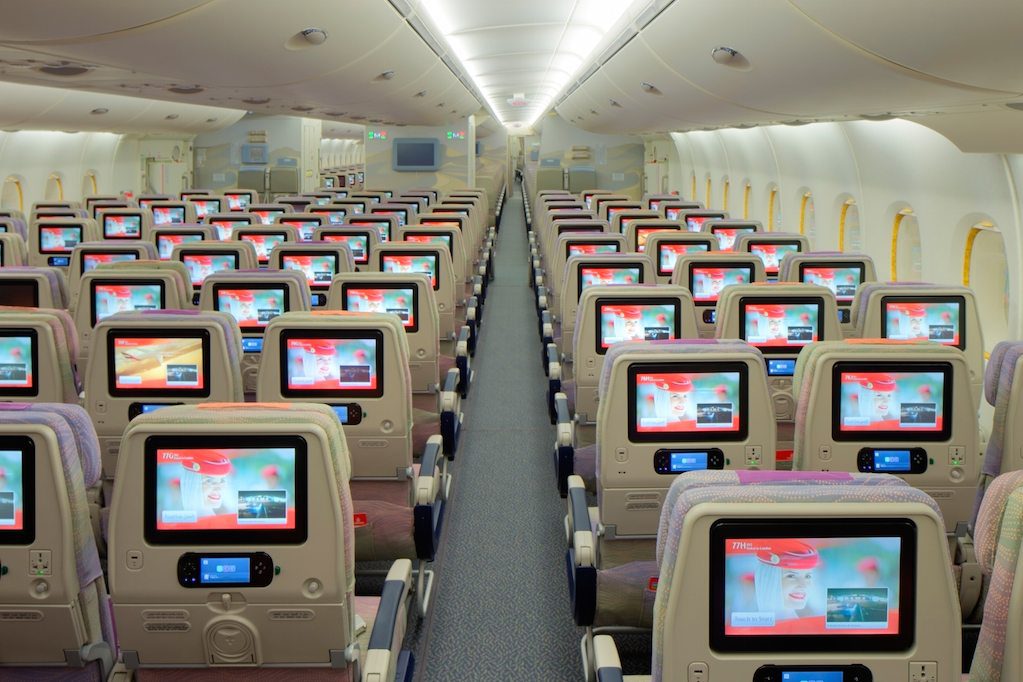Emirates Considers Adding Budget Economy Section to Lure Frugal Flyers

Skift Take
Emirates, long known for its high service standards and comfortable seating, even in economy class, is studying whether to create a "budget economy" cabin with narrower seating and fewer perks to satisfy frugal customers who always book the lowest price, airline president Tim Clark told Skift on Thursday in London.
"The fact of the matter is there is a whole stream of new market segments coming in that are budget conscious," Clark said in an interview at the Aviation Festival, an annual conference. "I think we can adapt what we do to be able to accommodate not all of it, but some of it."
Emirates generally does not not compete directly with major long-haul low-cost carriers, such as Air Asia X, Norwegian Air, and Wow Air. But it is still often undercut on price on popular international routes, both by major legacy airlines with strategic goals or excess capacity and by carriers with lower costs.
Clark acknowledged Emirates is generally considered a premium carrier, but said it faces the same issues as many others. Often, travelers go to a search engine, choose their origin and destination, and look for the lowest base fares. "The gaming going on at the moment in these booking engines is affecting what we do," Clark said.
Emirates recently started addressing the issue by adding fees on cheap fares, including a new charge implemented last year for advance seat assignments. And on Wednesday, Clark said Emirates could start selling fares that do not include free checked bags.
But Emirates is thinking bigger, Clark said, asking how it can give frugal customers prices they demand and still make money. One option, Clark said, is to slice economy class into three or four sections, all with different amenities and prices. Now, Emirates has one economy class section — a one-size-fits-all product.
Perhaps, Clark said, Emirates will have tiers like "economy plus," — a version of premium economy — followed by "normal economy," followed by "budget economy."
Customers in budget economy probably would still get free meals, Clark said, but might pay for other extras, including luggage and advance seat assignments. A budget customer seeking a better experience — or one who brought more luggage than expected — might trade up to "normal economy" before the flight, he said.
"I've got to find sections in the airplane, which we could almost curtain off, that have their own restrooms and galleys unique for the product," Clark said. "And they'll have a set of crew dealing with them."
Clark said budget economy, if implemented, likely would have similar seat pitch to economy class today, because even thrifty passengers value legroom. But he said width is less important to frugal customers, and noted it's now possible to squeeze in an 11th seat per row on new A380s.
"If you do go for a budget, you want to create the appearance of sameness, even though it's not," Clark said. "The trick is to get the seat design right. You get the ergonomics right, and make it slightly smaller and nobody notices the difference."
The budget product, he said, might help Emirates attract customers who do not fly it because it might be slightly more expensive than the competition. He said he suspects they would prefer a budget version of Emirates over some other airlines.
"What we find is that people want the cheapest price but they also want our brand," he said. "They trust us, they want us, and they like us — especially the 380."
But budget travelers aren't the only people Emirates might attract. Clark said budget economy might be popular among people who rarely or never travel. That market segment, he said, "would be ready to move because you've just gone down to the price point they'll pay."
An unusual product
What Clark is proposing is unusual, because most airlines still have at most two economy class cabins — premium economy and regular economy.
But his goal — ensuring Emirates can retain and attract value-oriented customers — is not abnormal.
Clark noted that several airline companies, including Lufthansa Group, own low-cost carriers that market to frugal travelers and keep them from defecting to an airline like Norwegian. Lufthansa's Eurowings brand, Clark said, is a essentially a "budget" economy offering — perhaps a step below Lufthansa's usual service, but still a quality product.
Meanwhile, three of the largest U.S. airlines — United Airlines, American Airlines, and Delta Air Lines — all offer what they call Basic Economy, a no-frills fare designed to keep customers from flying discounters like Spirit Airlines and Frontier Airlines. Unlike what Emirates proposes, American, Delta, and United have not created a separate physical cabin, though they generally assign Basic Economy customers the worst seats.
For Emirates, there's little incentive to start a new discount airline, like Eurowings. But Clark noted Emirates has a huge fleet of double-decker A380s, with a "fabulous bit of real estate," giving Emirates plenty of room to experiment.
"Yes, we are a full-service carrier," he said. "We have some very big airplanes. We have the capability of slicing and dicing our product offering, and technology allows us to put in all processes to make that work. Is it doable? It's doable now — if I wanted to."
He said he knows some will be surprised Emirates is considering a budget product, but he said airlines must adapt to customers' preferences.
"With the full-service [airlines] and the long-haul low-cost, the notion that there wouldn't be a hybrid — that's Jurassic thinking," he said.




